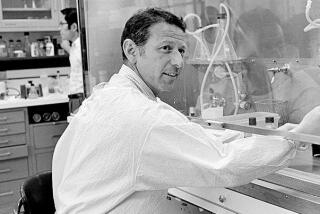Moe Berg: Master Spy
- Share via
Shhh. Not so loud.
Anybody could be listening.
So, with a finger to his lips, Moe Berg meandered through 15 years as a journeyman major league catcher, and spent much longer than that as one of baseball’s most shadowy characters.
Berg was a scholar, a graduate of Princeton and Columbia Law School, master of many languages, a solitary character who sometimes seemed to change appearances like a chameleon, here one minute, gone the next.
Perfect for a spy.
That was Berg’s assignment in the years before and during World War II. Many of his exploits remain classified to this day, because that’s the way of the CIA. But there is enough known to make him the subject of an ESPN Classic SportsCentury profile, set to air July 12.
There was, for example, a barnstorming trip to Japan with a team that included Babe Ruth, Lefty Gomez and an assortment of other All-Stars, dispatched to the Orient to introduce baseball to a new population. Included on the roster was Berg, an unlikely member of this high-profile group, ostensibly sent along because he was fluent in Japanese. The theory was Ruth could hit the home runs and Berg could explain them.
He had other assignments, too.
*
One day during the trip, Berg was touring Tokyo, wearing a kimono and carrying a camera under it, when he found himself on the roof of a downtown hospital, which happened to be the tallest building in the city. There he took pictures, a casual sightseeing outing. Years later, when Gen. Jimmy Doolittle staged bombing raids over the city, the ballplayer’s snapshots were supposed to have provided useful reconnaissance information.
By 1940, Berg’s playing days were done and he had signed on as a coach with the Boston Red Sox. On opening day in Washington, President Roosevelt threw out the first ball. As the players gathered in front of the presidential box, FDR spotted Berg in the middle of the crowd.
“There’s Moe Berg,” he exclaimed. “Hi, Moe.”
“Hello, Mr. President,” the catcher-coach replied.
The exchange left both teams bewildered. How come the president of the United States knew this third-string catcher?
How come, indeed.
*
Old teammate Eldon Auker remembered mysterious Moe. “When we were in Washington,” the ex-pitcher said, “he was never around.”
Apparently, Berg had other business there.
He was frustrated in his first year as a coach, sitting in the Boston bullpen, watching the conflict in Europe escalate, convinced that his country would soon be involved.
“Europe is in flames, withering in a fire set by Hitler,” he said. “What am I doing sitting here in the bullpen telling stories?”
So he sought more useful pursuits.
*
Berg’s unique talents were well known to the government, particularly to Wild Bill Donovan, who ran the OSS, which later became the Central Intelligence Agency. Donovan enlisted Berg for a variety of tasks. The most intriguing occurred in December 1944, when the ball player was dispatched to Zurich to attend a conference at which the primary speaker was German scientist Werner Heisenberg.
In one pocket, Berg carried a hand gun. In the other, he had a suicide pill.
Locked in a desperate race to build an atomic bomb, the United States needed to know how close Germany was to that goal. Heisenberg would have the answer. If the Germans were close, Berg’s instructions were to kidnap or kill the scientist, who would be a key man on the project.
*
This was a bold assignment for Berg but he seized it with zest. If someone grew suspicious, his cover story would be that he was an older graduate student. Certainly, that was as plausible as the time he showed Soviet soldiers in Czechoslovakia letterhead from Texaco Oil when they asked for credentials.
As Heisenberg spoke, Berg became convinced the German bomb was not imminent. That night, he found himself at a cocktail party with the scientist, an informal gathering of intellectuals. During the conversation, Heisenberg said, “It’s a shame, Germany has already lost the war.” That clinched the matter for Berg.
The Germans were not close. There was no need for anyone to be shot or kidnapped. And the suicide pill went unused.
More to Read
Go beyond the scoreboard
Get the latest on L.A.'s teams in the daily Sports Report newsletter.
You may occasionally receive promotional content from the Los Angeles Times.










